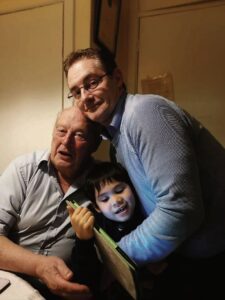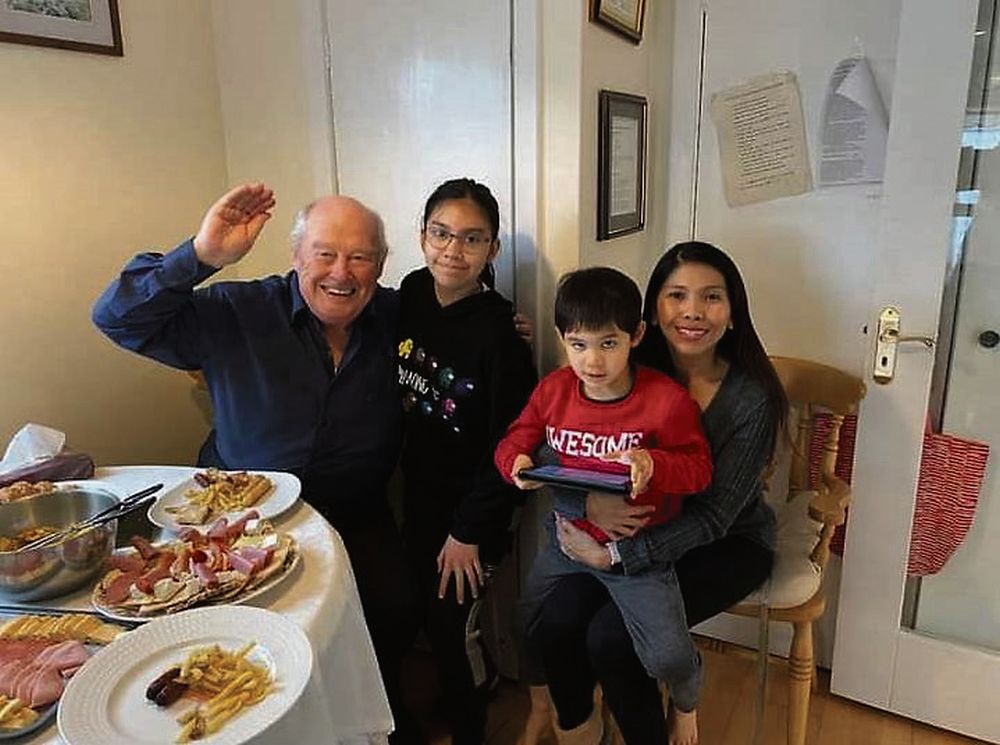-
-
Author: Denise McNamara
~ 13 minutes read
Children with disabilities across Galway are waiting years for vital services to help with basic skills such as speaking and moving that will be essential to help them lead more independent lives.
Parents are considering mounting a protest outside the Dáil after being fobbed off constantly by the Health Service Executive about the lack of staff to give speech and language, occupational and behavioural therapy.
Despite releasing a national plan about addressing the lengthy waiting lists across the country in disability services for children and young people – labelled the ‘roadmap for service improvement 2023-2026’ – families have been warned by staff in one Children’s Disability Network Team (CDNT) that there is unlikely to be any changes in the dire lack of support in the short to medium term.
Parents waiting years
Thomas Lawless said parents of around 600 affected children and youths in the CDNT 7 – those living in Tuam, Loughrea, Athenry and Abbeyknockmoy – are waiting “years and years and years” for an assessment to determine the type of disability and then an assessment of need to help improve their situation. Even if the parent gets that far, they are abandoned.
“I’ve a colleague whose child is 16 and he’s barely received anything at all. I’m only waiting one year for my twin boys – I’m one of the lucky ones – but I’ve been told by two women in the CDNT that there’s no chance of in the short to medium term of getting any sort of therapy,” he told the Connacht Tribune.
“They’re putting it onto the parents. They’re giving them iPads with a programme and saying, there you go, do it yourself. That’s not one-on-on therapy. The horror stories you hear would plunge you into a pit of despair.”
A teacher from Tuam, he returned from the United Arab Emirates with his wife and boys, now aged five, a year ago so they could be educated in Ireland.
After learning of the waiting list to even get a diagnosis, he paid thousands of euro for one in Dublin which confirmed the couple’s suspicions that the boys both had autism. One of them is non-verbal and they both now go to a preschool where a dedicated special needs assistant has been allocated.
“That’s no substitute for a speech and language therapist and a behaviour therapist and an occupational therapist (OT). We’ve brought them privately to an OT in Claremorris but it’s very hard to locate a speech and language therapist – apparently, they’re all emigrating to Australia once qualified.

“The tremendous distress this is causing families. These are vulnerable children who need help now to be independent in the future. If they don’t become independent, they’re going to be dependent on the State and welfare, which will cost the State a lot more in the long run. More help now is what’s needed for a desperate problem, but there just doesn’t seem to be any urgency.
“They have an action plan but there’s nothing in it to radically address the problem with recruitment now – now when children are young and can absorb these therapies to improve their speech, improve behaviour, social skills.”
State is ‘failing kids’
William Silke said his son Hunter, 8, has been under a team for over two years and has still not undergone a psychological assessment. He had a handful of speech and language sessions but nothing for over six months. An Occupational Therapist has seen him several times which has resulted in a marked improvement in his mobility.
“The Irish State has failed our children at every single step and stage of their development, and in doing so is causing irreparable life-lasting damage,” he fumes.
“Stressed and overwhelmed parents are now being forced to become ‘at-home therapists’, using YouTube, WhatsApp groups or having to go private to figure things out.”
His family went to the Credit Union to borrow €3,000 to get Hunter privately diagnosed.
“If you don’t have an assessment you can’t avail of any clinical supports. He was given a device but that doesn’t address his issues such as not pronouncing words, there’s no way he can be comprehensible without one-on-one therapy, he’s not able to put sentences together, he doesn’t understand danger.”
Figures by the HSE last August stated there were 744 children across Galway waiting up to two months for a speech and language therapy assessment and 1,276 waiting between four and five months for the first appointment.
The HSE claimed that the average waiting time for occupational therapy was eight weeks for children up to age four and 40 weeks for those aged between five and 17 years old. The vast majority of this age group – 319 children – were waiting over a year.
The roadmap for service improvement said there were 949 children with disabilities on a waiting list across the catchment of Galway, Mayo and Roscommon, the lowest level of anywhere in the country. Of these 80 had an overdue assessment of need evaluation and 227 needed a preliminary team assessment assessed.
Children’s Disability Network Teams have a national average vacancy rate of 34% – or 700 posts – with some teams experiencing vacancy rates of over 60%.
“Filling these vacancies is hugely challenged by a shortage of health and social care professionals internationally. In a tight labour market, we are competing against public and private services to fill these posts.”
Staff recruitment
The plan advocates the addition across the country of 20 new clinical psychology trainee placements ever year from September, the recruitment of 462 Health and Social Care Professionals (HSCPs) by the end of 2024 and 300 therapy assistants between 2023 and 2025 to support HSCPs. It also recommended the upgrading of up to 60 senior posts to clinical specialist grade to help with staff retention.
Thomas Lawless doesn’t hold out much hope of meeting those targets.
“We are considering having a protest outside the Dáil of parents nationally to get them to listen.”
William Silke points out that Ireland has not yet ratified the Optional Protocol of the United Nations Convention on the Rights of Persons with a Disability (UNCRPD).
“If fully incorporated into Irish Law, this would effectively provide legislative mandates and recourses on Government healthcare services for our children.
“When therapies are ad hoc, when assessments are left uncompleted, and children are only offered brief ‘blocks’ of therapeutic interventions once a year – if they are lucky – we only see evidence of our children being abandoned and damaged by the Irish State.”
Response from the HSE
The Health Service Executive said that services are provided for children and teenagers up to the age of 18 based on “their level of need rather than diagnosis”.
A recently devised service plan has been developed for Children’s Disability Network Team 7.
“This will include all families having an updated Individualised Family Service plan in 2024, in line with Progressive Disability Services. Running in parallel, will be an increased focus of intervention delivery with application of universal and target supports for families currently waiting,” the spokeswoman said.

“At this time, our staff and the families we support, are coping with waiting times and staffing shortages which mean that often our service falls short of what people and families expect, and what our staff would want to deliver.
“Due to the challenges in recruitment, there is a significant impact on the number of children allocated a key worker. In our view, it is not acceptable to have to wait an extended time for either an assessment or for supports and therapies that would help your child and your family.
“We are working to recruit more staff, and we are working with the staff we have to make the most of our team time and expertise, and to keep families better informed. Intensive recruitment efforts are ongoing through local and national panels.”
An overseas recruitment programme is currently being rolled out in conjunction with National HSE Human Resources.
The staff vacancy rate for CDNT 7 North Galway area is at 39% overall with a total of 21.8 WTE staff are working.
“A Physiotherapist Assistant and Social Worker recently started working within CDNT 7 Network Area. A part time Psychologist is due to be in place before Christmas and a Senior Speech and Language Therapist will also be joining the team in the New Year. This will increase staffing levels by 3.6 WTE.”
Extensive work is currently underway to ensure up to date contact details are held on file for all families within CDNT 7 North Galway area.
Case studies:
Parents who are part of the Children’s Disability Network Team (CDNT) 7 have set up a WhatsApp group to support each other.
A member of that group, William Silke, has collated stories from distraught families who feel they have effectively been abandoned by the State to care for their children, some with very complex needs.
Here is a snapshot of six of those accounts, with the names withheld.
Case No 1: “My daughter cannot swallow and has suffered from collapsed lungs and since a very early age has had a feeding tube inserted into her belly and has been hospitalised numerous times. She also has autism.
She saw one therapist at the age of three and at the age of eight. Since the inception of the CDNTs, there have been no key workers or primary consultants to help with post-hospital treatments and therapies.
“Her stomach peg was removed just over a month ago without any psychological, occupational or consultative supports during a highly traumatic time. She now has constant meltdowns and refuses to go to school.”
Case No 2: “We are in need of respite or residential care for my son ASAP as a matter of urgency. In the past month alone, my son repeatedly kicked the glass doors leaving Supermacs, he has been sent home numerous times from school for kicking off, on one of these occasions attacking a teacher, pulling her hair, scratching her face and pulling off her glasses. He has kicked me in the face, although this wasn’t really intentional, but it bloody hurt.
“Things have once again deteriorated in the home. My 16-year-old daughter needs to have a space to relax without being afraid that my son is going to kick off. He has kicked her head repeatedly on one occasion, ran up to her and yelled in her face a few times.
“He cut my water pipe in the upstairs bathroom and flooded the room and my kitchen. This has been her reality for the last ten years, I’ve rarely put her first, and it’s so unfair on her.
“It was easier when my son was younger, smaller and less volatile. Now I can’t really leave him with anyone who is not able for him in case he injures himself or them. Or causes damage to something.”
Case No 3: “I’m a single parent with no family support who has a teenage son autism spectrum disorder (ASD) and dyspraxia. At my son’s two-year developmental check, the Public Health Nurse picked up on significant delays in terms of speech and language and coordination issues and he was referred for an Assessment of Need.
He was offered one block of therapy per year and the therapist discharged him after the second block due to him being ‘non-compliant’ and ‘difficult’ as my son was only making animal noises at that stage.
“The Primary Care psychologist would not consider him for early intervention due to the wait list and held off on an autism assessment although he went over the markers for that diagnosis at age three. I borrowed money and sent my son to the children’s language and development preschool and within weeks he started to develop language.
“Four years later he was seen by Enable Ireland Galway and received some Occupation Therapy (OT) for about a year. Enable Ireland discharged him to Galway, Roscommon ASD in Athenry and I heard nothing for two years.
“He received Speech and Language reviews and some group OT sessions then that service was disbanded and replaced with the CDNT7 in Tuam. I attended a parent advice clinic and was told by the OT and social worker that their case load was full so they could offer nothing other than a two-line letter recommending a change of school for my son due to bullying and lack of resources. For nearly six months I tried to contact CDNT7 about a physio review without a single response.
“My son has fallen through the cracks so many times due to lack of disability services for children, soon he’ll age out of the system.”
Case No 4: My son, now eight, was diagnosed with ASD when he was four and started receiving speech and language therapy as he still wasn’t talking and found it very difficult and frustrating to communicate and understand anything. He also had OT sessions once in a while.
“For at least past two years we didn’t have any therapy at all. If it wasn’t for school teachers in the ASD unit, things would have been much worse, the support and help they provide for children is unreal.
Case No 5: “Our son was in early intervention in Tuam at the age of one and got discharged at age six after very little service to the Athenry Team where he has been on a waiting list for five years and has never seen. Since those teams were disbanded, he is under the CDNT7 and to date he’s received one physio appointment, an appointment to see what he needs service wise, one speech and language appointment, and two trainee psychologist appointments, plus she went out to his school once.
“We’ve had to go private for speech and language and only went private in the last few months for Occupational Therapy which he needed from the beginning. We have him on a waiting list for private psychology.”
Case No. 6: “We have an autistic son diagnosed at the end of 2022 at part of a pilot project. He requires multidisciplinary input and he was referred to CDNT7.
“We got a letter that he was accepted by CDNT7 in January but since then the only contact we have had with them is letters about our data and family forum meetings.
”I feel all the talk about early intervention being crucial and the benefit of an early diagnosis is going to waste. Our son’s key developmental years are passing by with zero professional input provided.”
(Main photo: The Silkes: grandad Liam with his daughter-in-law Crislyn, 13-year-old granddaughter Venice, and eight-year-old grandson Hunter).
For more, read this week’s Connacht Tribune:
Connacht Tribune Digital Edition App
Download the Connacht Tribune Digital Edition App to access to Galway’s best-selling newspaper. Click HERE to download it for iPhone and iPad from Apple’s App Store, or HERE to get the Android Version from Google Play.
Or purchase the Digital Edition for PC, Mac or Laptop from Pagesuite HERE.
Get the Connacht Tribune Live app
The Connacht Tribune Live app is the home of everything that is happening in Galway City and county. It’s completely FREE and features all the latest news, sport and information on what’s on in your area. Click HERE to download it for iPhone and iPad from Apple’s App Store, or HERE to get the Android Version from Google Play.
More like this:

Students from Presentation College Headford celebrate Climate awards
Three students from Presentation College Headford are celebrating awards for their projects at th...

Councillors lodge opposition to wind farm development near Belclare with An Bord Pleanala
Tuam area councillors have officially voiced their opposition to a significant wind farm developm...

Eyrecourt farm is overall winner of the Aurivo Milk Quality Awards
A County Galway farm has been chosen as the overall winner of the Aurivo Milk Quality Awards. Dar...

People Before Profit city candidates demand city council be more “proactive” in tackling housing crisis
The three People Before Profit candidates standing in the city in the upcoming elections are dema...

Athenry teen scoops two national awards at Student Enterprise Finals
Cormac Monaghan from Presentation College Athenry has taken first prize in the Intermediate categ...

County Council to look at installing recycling banks in Claregalway
Galway County Council is to look at the possibility at installing recycling banks in Claregalway....

New City Council Chief Executive cites Ring Road delivery as top priority for his 10-year term
Galway City Council’s new Chief Executive says the delivery of the Ring Road is his top pri...

Status yellow thunderstorm warning issued for Galway SS/NN
A status yellow thunderstorm warning has been issued for Galway and four other counties along the...

Multi-million euro Athenry and Tuam projects proceed to detailed design stage
Detailed designs are now being prepared for two multi-million euro renewal projects in Athenry an...
Sign Up To get Weekly Sports UPDATES




